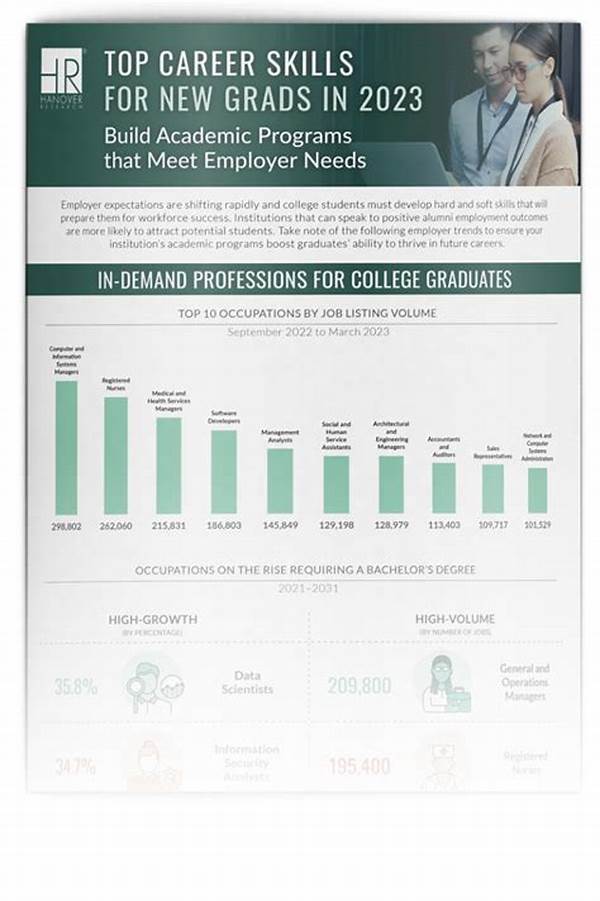In today’s rapidly evolving job market, the employment prospects for recent graduates present a multifaceted topic that demands careful consideration. As these individuals transition from academic environments into professional domains, they encounter various challenges and opportunities. The competition for positions is daunting, yet the emergence of new industries and technological advancements provides a landscape ripe with potential. Employers are on the lookout for candidates who not only possess the requisite knowledge but also demonstrate adaptability and innovation. This article seeks to explore the various dimensions of career prospects for new graduates, examining the factors that influence opportunities and the strategies that can enhance employability.
Read Now : Resume Building Workshops On Campus
The Current Job Market Landscape
The current job market presents a complex and dynamic environment for new graduates. The employment prospects for recent graduates are influenced by numerous factors, including economic conditions, industry-specific demands, and the ever-evolving nature of technological advancements. While certain industries are experiencing a downturn, others are burgeoning, presenting fresh opportunities for those equipped with the right skills. In this competitive sphere, recent graduates must leverage their academic achievements along with practical experiences to distinguish themselves from their peers. Moreover, an understanding of industry trends, coupled with the ability to adapt to new tools and technologies, can significantly enhance a graduate’s prospects. As such, it becomes imperative for graduates to engage in continuous learning and development to maintain relevance in the workforce.
Key Factors Influencing Employment Opportunities
1. Technological Advancements: The integration of technology in various sectors requires graduates to be proficient in digital tools, thereby widening their employment prospects.
2. Industry Demand: The demand in specific industries fluctuates; health care, data science, and renewable energy currently offer promising opportunities for recent graduates.
3. Economic Conditions: The overall economic health of a region can either enhance or limit employment prospects for recent graduates, affecting job availability and salaries.
4. Networking Opportunities: Strong professional networks can provide recent graduates access to job openings and industry insights, thus improving their employment prospects.
5. Graduate Competencies: Employers seek graduates with not only academic achievements but also soft skills such as communication, problem-solving, and adaptability, which are critical in enhancing employment prospects for recent graduates.
Read Now : Low-cost Academic Resource Access
Enhancing Employability through Skill Development
In an era marked by rapid change, the need for continuous skills enhancement becomes pivotal for recent graduates. As employment prospects for recent graduates largely depend on their adaptability to the evolving job market, pursuing additional certifications or courses can provide a competitive edge. Moreover, internships and apprenticeships offer practical experience, which can be invaluable in demonstrating applied knowledge to potential employers. Furthermore, graduates who actively engage in professional development workshops or industry seminars stand to gain significant insights. By fortifying their skillsets in line with market demands, recent graduates can position themselves effectively to seize emerging opportunities and navigate career pathways successfully.
Strategies for Navigating Employment Challenges
In addressing the challenges faced during the transition from academia to the workforce, several strategies can enhance employment prospects for recent graduates. Firstly, aligning educational experiences with market demand is essential; this may involve seeking guidance from career advisors or participating in mentorship programs. Secondly, graduates are encouraged to develop a robust online presence, highlighting their professional achievements and competencies. Thirdly, embracing flexibility in job preferences, such as considering freelance or remote work opportunities, can widen potential job prospects. Fourthly, engaging with professional associations provides access to industry-specific resources and networking events. Finally, adopting a proactive approach in job searching by tailoring applications to showcase both technical capabilities and personal strengths can make a significant difference.
Understanding Employer Expectations
For recent graduates, understanding employer expectations is a crucial component in improving employment prospects. Employers today value candidates who exhibit not only technical proficiency but also a readiness to collaborate and innovate. It is essential for graduates to convey their problem-solving abilities and showcase their potential to contribute meaningfully to team dynamics. Furthermore, demonstrating a commitment to lifelong learning and development signals to employers a candidate’s dedication to evolving alongside industry trends. In cultivating a resume that reflects both academic prowess and work ethic, new graduates can effectively communicate their readiness to meet the demands of various professional environments.
Summary of Employment Prospects for Recent Graduates
Summarizing the employment prospects for recent graduates reveals a landscape that is both challenging and filled with potential opportunities. The transformation of industries, coupled with global economic changes, makes it crucial for graduates to stay informed and adaptable. Engaging in ongoing education and skills development is of paramount importance to enhance employment prospects. Furthermore, leveraging personal networks and understanding market trends can provide an edge in a competitive job market. Despite the hurdles, there exists a wealth of opportunities for those who are prepared to pursue them with perseverance and strategic planning. With an approach that combines knowledge, skill, and adaptability, recent graduates can successfully navigate the complexities of the modern job market and secure rewarding career paths.
